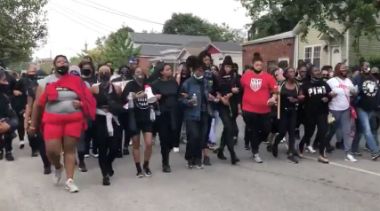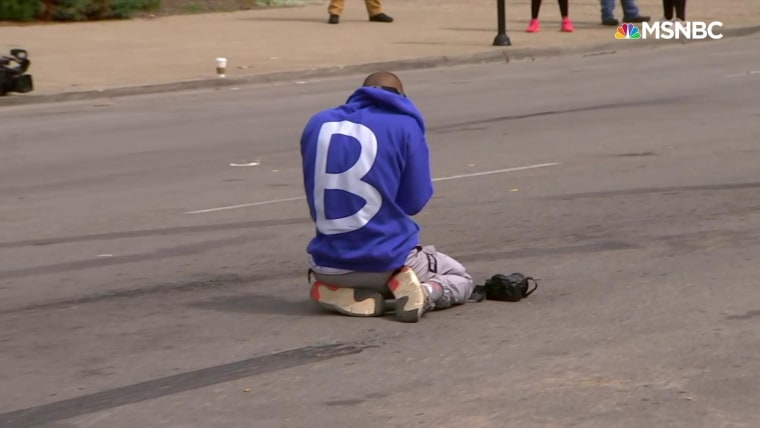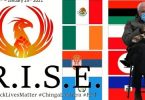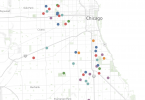One of the police officers involved in the shooting death of Breonna Taylor in her home in Louisville, Kentucky, in March was charged Wednesday with first-degree wanton endangerment.
Judge Annie O’Connell announced the charges against the former Louisville detective, Brett Hankison, who was fired in June, during a grand jury proceeding. A warrant will be issued for his arrest, O’Connell said.
The charges accuse Hankison of firing blindly into several apartments and recklessly endangering Taylor’s neighbors, but do not charge him with firing at or killing Taylor. Two other officers involved in the March 13 incident, Detective Myles Cosgrove and Sgt. Jonathan Mattingly, were not charged.
At a news conference Wednesday, Kentucky Attorney General Daniel Cameron acknowledged that there had been calls for all three officers to be charged, including from Taylor’s family, who had called for nothing less than manslaughter charges.
But, Cameron said, “our investigation showed, and the grand jury agreed, that Mattingly and Cosgrove were justified in their return of deadly fire after having been fired upon” by Taylor’s boyfriend, Kenneth Walker.
Ben Crump, an attorney for Taylor’s family, expressed outrage at the Jefferson County grand jury’s decision to indict Hankison “for bullets that went into other apartments but NOTHING for the murder of Breonna Taylor.”
“This is outrageous and offensive!” he tweeted.
Mattingly’s attorney, Kent J. Wicker, said the grand jury’s decision not to charge his client or Cosgrove “shows that the system worked and that grand jurors recognized and respected the facts of the case.”
“The death of Breonna Taylor is a tragedy. But these officers did not act in a reckless or unprofessional manner,” Wicker said in a statement. “They did their duty, performed their roles as law enforcement officers and, above all, did not break the law.”
Bond for Hankison was set at $15,000 full cash.
Kentucky attorney general says use of force by 2 officers was ‘justified’
Taylor, 26, an emergency medical technician, was shot and killed in her home on March 13, after police officers with a no-knock warrant broke down her door seeking evidence in a narcotics investigation. The target of the probe did not live at the location.
Walker, her boyfriend, fired a shot at the front door, striking Mattingly in the leg, according to police. Walker, who had a license to carry firearms, said he believed it was a home invasion.
It had been previously reported that Taylor was shot five times during the raid, but Cameron said she was struck six times. An FBI analysis determined the fatal shot was fired by Cosgrove.
Cameron said that his investigation shows that officers knocked and announced themselves as police before entering Taylor’s apartment. He said this was corroborated by a civilian witness who was near Taylor’s apartment on the night of the shooting.
Other witnesses have said they did not hear police announce their presence.
“In other words, the warrant was not served as a no-knock warrant,” the attorney general said.
He also noted that the three officers “had no known involvement in the preceding investigation or obtainment of the search warrant.”
“They were called in to duty as extra personnel,” Cameron said at his news conference.
According to the attorney general, when officers were unable to get anyone to answer the door at Taylor’s apartment, “the decision was made to open the door.”
Mattingly then entered the residence and saw Taylor and Walker standing at the end of the hall. Cameron said Walker was holding a gun and fired, striking Mattingly, who returned gunfire.
“This all took place in a matter of seconds,” Cameron said, adding that Mattingly fired six shots and “almost simultaneously” Cosgrove fired 16 times from the doorway. He said there is no evidence that Hankison’s bullets hit Taylor.
“Our investigation found that Mattingly and Cosgrove were justified in their use of force after having been fired upon by Kenneth Walker,” Cameron said.
Taylor’s death has sparked months of protests. Ahead of Wednesday’s announcement, the city battened down in anticipation of possible unrest.
Federal buildings were closed to the public this week, with first-floor windows of the U.S. District Courthouse boarded up; barricades were placed downtown; and Louisville police declared a state of emergency.
Mayor Greg Fischer said at a news conference Wednesday that he was imposing a 72-hour curfew starting at 9 p.m.
“Our goal is ensuring space and opportunity for people to gather and express first amendment rights while maintaining public safety,” he said.
“We’re asking people to do their public protest during light. That’s the purpose of having the curfew. Most of the violence we’ve encountered over the past few months has occurred after dark.”
Hankison fired for shooting ‘blindly’
Hankison was fired in June for “wantonly and blindly” firing into Taylor’s apartment, according to his termination letter. Cosgrove and Mattingly, who, like Hankison, fired their weapons during the raid, were placed on administrative leave.
Also placed on leave was Detective Joshua Jaynes, who applied for the warrant used in the raid.
Cosgrove, Mattingly and Jaynes along with three other officers — Detectives Tony James, Michael Campbell and Michael Nobles — are all under internal investigation by the police department’s Professional Standards Unit, police said.
That police probe is separate from the state attorney general’s investigation, which began in May. The FBI also announced in May that it was investigating the shooting.
In audio of investigators’ interviews that was released in July, Mattingly, who led the late-night raid, insisted that officers knocked and announced themselves.
In Walker’s interview with investigators, however, he said that there was banging on the door but that he and Taylor never heard anyone say “police,” according to the audio. Walker told the investigator that he and Taylor asked who it was and when they got no response, he reached for his firearm.
During the interviews by the Louisville Metro Police Department’s Public Integrity Unit, the investigator questioning Mattingly said officers’ use of a battering ram to break open the apartment door was “the most passive way in” to the apartment and said that Mattingly “rightfully” returned fire after Walker fired a shot.
Taylor’s mother filed a lawsuit against Hankison, Cosgrove and Mattingly, alleging that they did not announce themselves when they raided the home after midnight and engaged in “blindly firing” more than 20 shots into the apartment.
Taylor’s address had been listed on the police search warrant based on officers’ belief that a suspect, her ex-boyfriend, had used her home to keep drugs or stash money.
The wrongful-death complaint ended last week with Taylor’s family reaching a $12 million settlement with the city, the largest in Louisville’s history.
Ryan Nichols, president of the local police union, the River City Fraternal Order of Police Lodge 614, told local station WLKY that the settlement was premature as it came before the completion of the attorney general’s probe.
“Especially if the investigation shows the actions the police took were within the boundaries of the law and they didn’t violate anything, maybe that settlement doesn’t look the same,” he said.
Although the city admitted to no wrongdoing under terms of the settlement, the mayor said the agreement was “an acknowledgment of the need for reform.”
The Louisville police union has not responded to repeated requests for comment on the case from NBC News.
While Taylor’s fatal shooting happened in mid-March, it didn’t gain much national attention until the family’s lawsuit was filed two months later.
Taylor’s death came 2-1/2 weeks after the fatal shooting of Ahmaud Arbery by civilians in Brunswick, Georgia, and 2-1/2 months before the death of George Floyd while in police custody in Minneapolis.
The deaths sparked national protests that shined a harsh light on the nation’s long history of systemic racism, police brutality and the extrajudicial killings of Black Americans.











